Herbal Supplement Market
Herbal Supplement Market Size and Share Forecast Outlook 2025 to 2035
Herbal supplement market is projected to grow from USD 45.7 billion in 2025 to USD 107.4 billion by 2035, at a CAGR of 8.9%. Turmeric will dominate with a 23.9% market share, while capsules will lead the formulation segment with a 31.5% share.
Herbal Supplement Market Forecast and Outlook 2025 to 2035
The global herbal supplement market is set to grow from USD 45.65 billion in 2025 to USD 107.43 billion by 2035, adding USD 61.78 billion in new revenue and advancing at a CAGR of 8.9%. Growth is driven by increasing demand for natural wellness product validation, expanding preventive healthcare infrastructure across regulated consumer markets, and accelerating holistic health requirements among wellness-conscious populations seeking plant-based nutritional solutions.
Herbal supplement technologies are increasingly recognized as essential tools for health practitioners, offering natural bioactive compound capabilities, traditional medicine integration assurance, and comprehensive wellness support characteristics compared to synthetic pharmaceutical approaches.
Quick Stats for Herbal Supplement Market
- Herbal Supplement Market Value (2025): USD 45.65 billion
- Herbal Supplement Market Forecast Value (2035): USD 107.43 billion
- Herbal Supplement Market Forecast CAGR: 8.9%
- Leading Product in Herbal Supplement Market: Turmeric (23.9%)
- Key Growth Regions in Herbal Supplement Market: Asia Pacific, North America, and Europe
- Top Players in Herbal Supplement Market: Nature's Bounty, Jarrow Formulas Inc., Solgar Inc., Ancient GreenFields Pvt. Ltd., Gaia Herbs
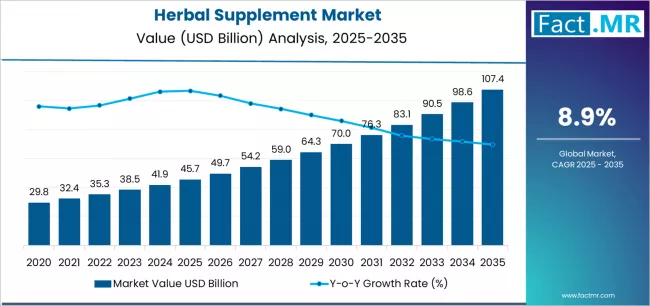
Turmeric-based formulations dominate the market, favored in wellness and therapeutic environments for their established anti-inflammatory properties, providing curcumin compound mechanisms, antioxidant capabilities, and scientific validation across diverse health applications and consumer demographics.
Capsule formulations remain fundamental in supplement delivery protocols where convenient consumption and standardized dosing match consumer requirements and wellness adherence confidence standards. Adult consumers are advancing among demographic categories as specialized health awareness networks expand and preventive wellness infrastructure increases accessibility in lifestyle-convenient formats with comprehensive nutritional support structures.
Geographic concentration demonstrates dynamic growth patterns with India and China leading expansion, supported by rising natural medicine capacity, herbal wellness consciousness expansion among consumer populations, and traditional medicine establishment programs in urban centers.
USA, Germany, UK, Canada, and Japan demonstrate robust development through established dietary supplement ecosystems, regulatory framework maturity for natural products, and standardized acceptance of herbal wellness procedures. Competitive advantage is consolidating around ingredient purity profiles, scientific validation documentation, manufacturing quality compatibility, and integrated wellness product portfolios rather than standalone herbal formulations alone.
The first half of the decade will witness the market climbing from USD 45.65 billion to approximately USD 70.61 billion, adding USD 24.96 billion in value, which constitutes 40% of the total forecast growth period. This phase will be characterized by the continued dominance of turmeric supplement in wellness applications, combined with accelerating adoption of moringa formulations in nutritional supplement applications where superfood recognition and nutrient density create favorable consumer wellness outcomes.
The latter half will witness sustained expansion from USD 70.61 billion to USD 107.43 billion, representing an addition of USD 36.82 billion or 60% of the decade's growth, defined by broadening acceptance of personalized herbal protocols and integration of evidence-based botanical platforms across mainstream wellness consumer facilities.
Where revenue comes from - Now Vs Next (industry-level view)
| Period | Primary Revenue Buckets | Share | Notes |
|---|---|---|---|
| Today | Turmeric | 23.9% | Product dominance |
| Capsules | 31.5% | Primary formulation | |
| Adults | 64.4% | Leading consumer segment | |
| Offline | 60.4% | Distribution channel | |
| Moringa | 14.0% | Superfood growth | |
| Future (3-5 yrs) | Personalized Formulations | 35-41% | Customization trend |
| Adaptogen Blends | 28-34% | Stress management | |
| Online Direct-to-Consumer | 48-54% | E-commerce expansion | |
| Immune Support Formulas | 32-38% | Wellness priority | |
| Organic Certifications | 38-44% | Clean label demand | |
| Functional Beverages | 22-28% | Convenient delivery | |
| Clinically-Tested Products | 30-36% | Evidence-based positioning |
Herbal Supplement Market Key Takeaways
At-a-Glance Metrics
| Metric | Value |
|---|---|
| Market Value (2025) → | USD 45.65 billion |
| Market Forecast (2035) ↑ | USD 107.43 billion |
| Growth Rate ★ | 8.9% CAGR |
| Leading Product → | Turmeric |
| Primary Formulation → | Capsules |
The market demonstrates exceptional fundamentals with Turmeric capturing a commanding 23.9% share through superior therapeutic characteristics, established anti-inflammatory advantages, and proven wellness profiles across natural health applications. Capsules drive primary formulation demand at 31.5% share, supported by established consumer convenience infrastructure and standardized dosing requirements that maintain consumption adherence across diverse supplement segments.
Geographic concentration remains anchored in Asia Pacific and North America with emerging market leadership through herbal medicine tradition expansion and wellness product infrastructure development, while developed markets show accelerated adoption rates driven by preventive health demographics and natural product preference procedures.
Imperatives for Stakeholders in Herbal Supplement Market
Design for efficacy and transparency, not just natural ingredients
- Offer complete wellness solutions: clinically-tested formulations + quality certifications + dosage guidance systems + scientific documentation support + consumer education platforms.
- Preconfigured wellness packages: immunity support specifications, inflammation management configurations, energy enhancement programs, and combination herbal protocols for diverse health requirements.
Quality assurance readiness for wellness applications
- Comprehensive testing documentation, GMP compliance systems, and quality infrastructure (ingredient traceability, purity testing, standardization protocols).
Affordability-by-design approach
- Cost-optimized product portfolios, flexible subscription pricing models, consumer loyalty programs, and transparent ingredient sourcing documentation.
Consumer education-focused market penetration
- Established wellness workshops + comprehensive information programs (ingredient benefits, safety profiles, usage guidance); direct consumer engagement for relationship development and wellness confidence building.
Segmental Analysis
The market segments by product into Turmeric, moringa, ginger, ginseng, echinacea, flaxseeds, and others, representing the evolution from traditional herbal remedies toward evidence-based wellness validation with bioactive compound capabilities, therapeutic efficacy characteristics, and specialized health applications. The formulation segmentation shows capsules' commanding 31.5% position with standardized delivery, followed by tablets, powder, liquid, soft gels, and others, reflecting distinct consumption preferences for convenient administration and dietary integration versus specialized delivery requirements.
The consumer segmentation shows adults' commanding 64.4% position, followed by geriatric, pediatric, and pregnant women, demonstrating varied health awareness levels and supplement utilization concentrations. The distribution channel segmentation divides the market into offline (60.4%) representing traditional retail pathways, and online for e-commerce delivery, reflecting distinct purchasing behaviors for in-person consultation and product inspection versus digital convenience approaches.
What makes Turmeric Command the Largest Share in the Herbal Supplement Market?
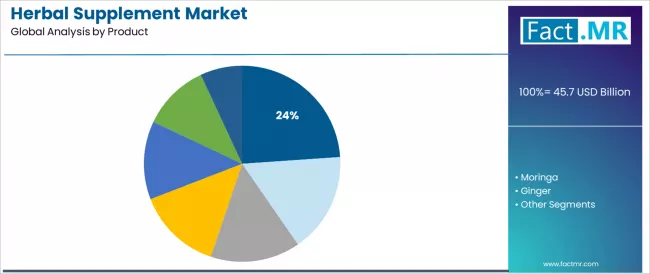
Turmeric commands the leading position in the herbal supplement market with a 23.9% market share through superior therapeutic characteristics, including established anti-inflammatory properties, extensive scientific research validation, and versatile health applications that enable consumers to achieve predictable wellness outcomes across varied health conditions and diverse demographic populations.
The segment benefits from bioactive compound advantages through curcumin concentration, proven therapeutic efficacy, and established safety profiles without requiring complex administration procedures. Advanced extraction technology enables standardization optimization, bioavailability enhancement, and formulation customization, where anti-inflammatory precision and antioxidant potency represent critical wellness support requirements.
Curcumin-standardized turmeric formulations hold significant share within the product segment, appealing to health-conscious consumers seeking clinically validated therapeutic capabilities. Turmeric supplement products differentiate through proven efficacy profiles, extensive research evidence advantages, and integration with established wellness protocols that enhance health outcomes while maintaining safe consumption patterns for diverse therapeutic applications.
Key market characteristics:
- Advanced bioactive properties with curcumin compounds and reproducible performance for inflammation management
- Superior research validation, enabling therapeutic claims and clinical evidence readiness for wellness applications
- Comprehensive consumer acceptance, including traditional medicine heritage and modern scientific inclusion for natural health applications
By Formulation, why are Herbal Supplement Capsules Consumed the Most?
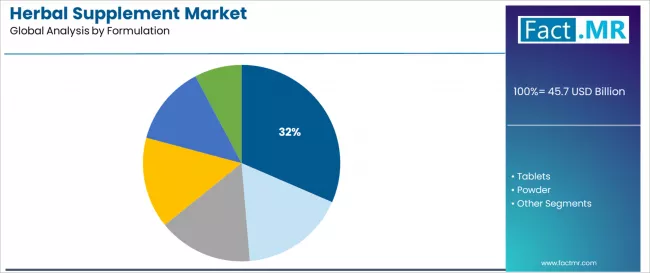
Capsules demonstrate formulation leadership in the herbal supplement market with a 31.5% share due to widespread consumer convenience requirements and established focus on odor masking, taste neutralization, and precise dosing that maximizes consumption adherence while maintaining consistent ingredient delivery characteristics.
Consumers and healthcare practitioners prioritize capsule formulations for effortless consumption, standardized dosing accuracy, and integration with daily wellness routines that enables coordinated supplementation experiences across multiple health protocols. The segment benefits from substantial manufacturing technology maturity and quality control campaigns that emphasize capsule-based delivery for critical herbal ingredient applications.
Vegetarian capsule options capture significant share within the formulation segment, demonstrating consumer preference for plant-based delivery formats. Preventive wellness expansion incorporates capsule supplement as convenient daily protocols for health maintenance programs, while personalized nutrition development increases customized capsule demand that meets individual requirements and ensures comprehensive wellness capabilities.
Which Consumer Demographic is the Dominant Consumer of Herbal Supplements?
Adults account for 64.4% of all herbal supplement consumption. This is attributed to comprehensive wellness awareness and sustained focus on preventive health, chronic condition management, and lifestyle optimization that maximizes quality of life while maintaining appropriate health maintenance standards.
Adult consumers and wellness advisors prioritize age-appropriate supplementation for health preservation requirements, comprehensive disease prevention, and integration with active lifestyle demands that enables coordinated wellness experiences across multiple life stages. The segment benefits from substantial health consciousness maturity and preventive care campaigns that emphasize adult-focused supplement delivery for proactive health management applications.
Chronic disease prevention incorporates herbal supplement as standard wellness protocols for inflammation management, while stress reduction needs increase adaptogenic supplement utilization that meets modern lifestyle requirements and ensures mental wellness capabilities.
Consumer dynamics include:
- Strong growth in millennial health-conscious demographics requiring clean label products and transparency documentation arrangements
- Increasing adoption in active aging populations for mobility support and cognitive health positioning
- Rising integration with fitness communities for performance enhancement and recovery optimization
What Makes Offline Distribution Maintain Channel Leadership in Herbal Supplement?
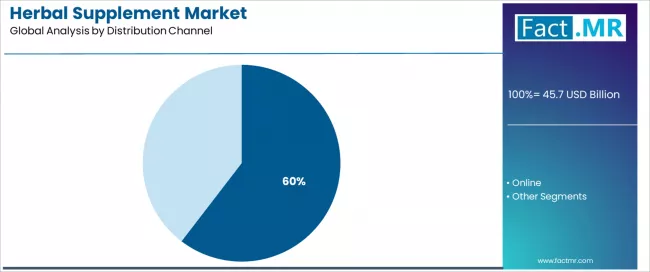
Offline distribution establishes channel dominance in the herbal supplement market with a 60.4% share through comprehensive retail presence and sustained focus on product consultation, quality inspection access, and immediate purchase gratification that maximizes consumer confidence while maintaining trusted shopping experiences.
Consumers prioritize offline retail environments for expert advice access, product authenticity verification, and tactile product evaluation that enables informed purchasing decisions across multiple supplement categories. The channel benefits from established pharmacy and health store infrastructure that emphasizes in-person consultation delivery for supplement selection applications.
Specialty health store expansion incorporates curated herbal supplement selections as premium retail protocols for educated consumers, while pharmacy channel development increases healthcare professional recommendation integration that meets safety requirements and ensures quality assurance capabilities.
What are the Drivers, Restraints, and Key Trends of the Herbal Supplement Market?
| Category | Factor | Impact | Why It Matters |
|---|---|---|---|
| Driver | Rising preventive healthcare awareness & natural wellness preferences (holistic health, lifestyle medicine) | ★★★★★ | Health consciousness enables herbal supplement demand for disease prevention validation; increasing natural product preferences drive botanical adoption across wellness markets and diverse consumer segments. |
| Driver | Growth in chronic disease prevalence and aging populations (lifestyle diseases, demographic shifts) | ★★★★★ | Drives demand for natural therapeutic systems and complementary medicine solutions; consumers seeking alternative approaches gain access to herbal-focused wellness segments. |
| Driver | Scientific validation and clinical research expansion (evidence-based medicine, efficacy studies) | ★★★★☆ | Consumers demand proven efficacy and safety-validated formulations; research advancement expanding addressable segments beyond traditional herbal demographics and alternative medicine clientele. |
| Restraint | Regulatory complexity & quality standardization challenges (varying regulations, adulteration risks) | ★★★★☆ | Quality-conscious consumers face safety concerns and efficacy uncertainty, restricting premium product adoption and affecting market penetration in regulated healthcare organizations and conservative consumer segments. |
| Restraint | Limited clinical evidence & efficacy perception gaps (research limitations, placebo concerns) | ★★★☆☆ | Consumers face confidence concerns and skepticism limitations; increases adoption barriers and affects market penetration in evidence-focused healthcare communities and medical professional recommendations. |
| Trend | Personalized nutrition and customized formulations (genetic testing, biomarker analysis) | ★★★★★ | Growing acceptance for individualized wellness approaches and targeted supplementation beyond generic formulations; personalization becomes core differentiation strategy for premium supplement positioning. |
| Trend | Clean label movement and organic certification demand (transparency, sustainable sourcing) | ★★★★☆ | Consumer preferences evolving beyond basic herbal content toward verified quality standards; transparency positioning drives enhanced brand trust and premium pricing in sophisticated wellness markets. |
Analysis of the Herbal Supplement Market by Key Countries
The herbal supplement market demonstrates robust regional growth dynamics with emerging leaders including India (11.1% CAGR) and China (10.3% CAGR) driving expansion through traditional medicine heritage programs and wellness consumer infrastructure development. Strong performers encompass USA (8.7% CAGR) and UK (8.1% CAGR), benefiting from established natural products infrastructure and preventive health adoption demographics. Developed markets feature Canada (7.9% CAGR), Germany (7.3% CAGR), and Japan (6.8% CAGR), where wellness integration normalization and supplement expertise support consistent growth patterns.
Regional synthesis reveals Asian markets leading adoption through traditional medicine positioning and herbal wellness expansion, while Western countries demonstrate measured growth potential supported by natural health preferences and scientific validation influence. North American and European markets show solid development driven by preventive care culture integration and dietary supplement infrastructure.
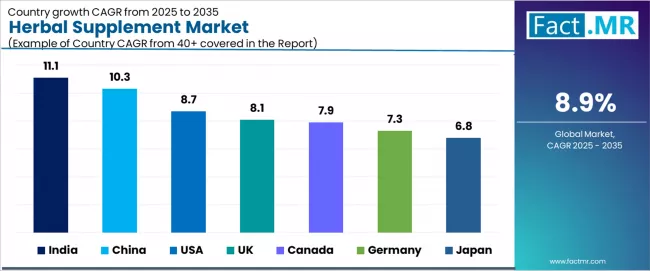
| Region/Country | 2025-2035 Growth | How to win | What to watch out |
|---|---|---|---|
| India | 11.1% | Focus on traditional medicine portfolios | Quality standardization; regulatory evolution |
| China | 10.3% | Lead with TCM-integrated positioning | Export restrictions; ingredient sourcing |
| USA | 8.7% | Provide evidence-based formulations | FDA scrutiny; claim limitations |
| UK | 8.1% | Offer clean label solutions | Brexit regulations; market fragmentation |
| Canada | 7.9% | Deliver natural health products | Regulatory compliance; seasonal demand |
| Germany | 7.3% | Maintain quality excellence positioning | Stringent regulations; evidence requirements |
| Japan | 6.8% | Push traditional wellness programs | Aging demographics; conservative adoption |
India Drives Fastest Market Growth
India establishes fastest market growth through progressive Ayurvedic medicine expansion and comprehensive traditional wellness infrastructure development, positioning herbal supplement as essential health solutions in urban wellness centers and emerging natural health facilities.
The country's 11.1% growth rate reflects rising health consciousness levels supporting wellness product spending and growing middle-class segments that encourage the deployment of traditional herbal formulations in diverse consumer settings. Growth concentrates in major metropolitan areas, including Mumbai, Delhi, and Bangalore, where health-conscious consumers showcase increasing adoption of scientifically validated traditional medicine that appeals to quality-focused buyers demanding authentic herbal ingredients and therapeutic efficacy outcomes.
Indian wellness consumers are developing integrated health approaches that combine traditional Ayurvedic knowledge with modern supplement formulations, including domestic brand expansion and quality certification growth. Distribution channels through pharmacy networks and health food stores expand market access, while practitioner education initiatives support adoption across diverse consumer types and wellness specialization levels.
China Emerges as Traditional Medicine Powerhouse
In Beijing, Shanghai, and Guangzhou regions, wellness consumers and traditional medicine practitioners are adopting herbal supplement technologies as essential health tools for preventive care operations, driven by increasing integration of Traditional Chinese Medicine with modern wellness and elevation of natural health expectations that emphasize the importance of botanical ingredients.
The market holds a 10.3% growth rate, supported by wellness industry development and herbal product manufacturing investment that promote supplement adoption for health maintenance applications. Chinese consumers are favoring TCM-based formulations that provide comprehensive health balance and traditional therapeutic principles, particularly appealing in urban centers where holistic wellness and cultural heritage represent critical health factors.
Market expansion benefits from substantial traditional medicine infrastructure and herbal manufacturing establishment that enable widespread adoption of botanical wellness methodologies for diverse health applications. Consumer adoption follows patterns established in preventive medicine excellence, where traditional knowledge advantages and modern validation documentation drive consumer confidence and wellness protocol integration.
USA Shows Natural Health Leadership
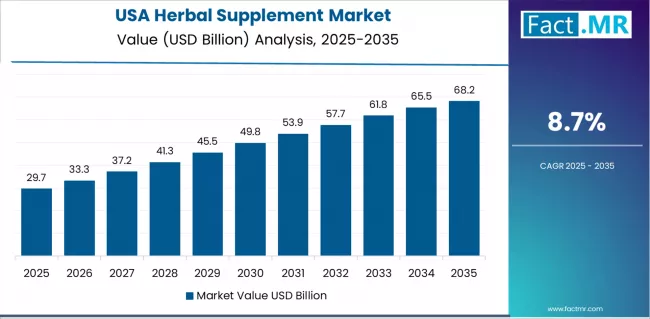
USA establishes natural health leadership through comprehensive dietary supplement infrastructure and established wellness ecosystem, integrating herbal supplement across retail pharmacies, health food stores, and online wellness platforms. The country's 8.7% growth rate reflects established FDA supplement framework maturity and sophisticated consumer health awareness levels that support widespread deployment of botanical products in wellness and preventive applications.
Growth concentrates in health-conscious regions, including California, Colorado, and Northeast states, where consumers showcase advanced natural product adoption that appeals to evidence-focused buyers seeking scientifically validated outcomes and comprehensive quality documentation.
American wellness consumers leverage established brand relationships and comprehensive quality expectation frameworks, including third-party testing verification and transparency documentation programs that create purchase confidence and health assurance. The market benefits from substantial functional medicine development and integrative health expansion that encourage premium supplement purchases while supporting continuous botanical innovation investments and clinical research funding.
UK Shows Natural Products Integration
UK's established wellness market demonstrates comprehensive herbal supplement adoption with documented natural health emphasis in product selection and wellness protocol execution through specialized health food retailers and established pharmacy networks.
The country maintains an 8.1% growth rate, leveraging harmonized regulatory frameworks with European standards and quality-focused consumer cultures in natural health. Major urban regions, including London, Manchester, and Edinburgh, showcase evidence-driven supplement priorities where herbal products integrate with established wellness environments and thorough quality practices to optimize health outcomes and maintain safety standards under stringent regulatory requirements.
The consumers prioritize comprehensive quality documentation and evidence-based formulation in supplement purchase decisions, creating demand for certified products with extensive validation, including third-party testing, organic certification, and clinical study support. The market benefits from established natural health sectors and wellness maturity that provide premium positioning opportunities and maintain alignment with MHRA regulatory expectations.
Canada Shows Natural Health Products Leadership
Canada's progressive wellness market demonstrates established herbal supplement adoption with documented regulatory emphasis in product approval and quality standard execution through comprehensive Natural Health Products framework and established wellness retailers.
The country maintains a 7.9% growth rate, leveraging established Health Canada regulatory oversight and quality-focused consumer cultures in natural health products. Major urban centers, including Toronto, Vancouver, and Montreal regions, showcase regulatory compliance priorities where herbal supplement integrate with established wellness cultures and systematic quality practices to optimize consumer safety and maintain therapeutic claim accuracy under rigorous health authority requirements.
Canadian consumers prioritize Natural Product Number validation and comprehensive ingredient documentation in supplement selection, creating demand for licensed products with extensive regulatory compliance, including Health Canada approval, quality system certification, and safety documentation. The market benefits from established natural health sectors and regulatory maturity that provide quality positioning opportunities and maintain alignment with Canadian natural health product regulations.
Germany Shows Quality Excellence Integration
Germany's advanced wellness market demonstrates sophisticated herbal supplement integration with documented quality emphasis in product selection and therapeutic protocol precision through specialized Apotheke networks and established natural health retailers. The country leverages rigorous quality system principles and evidence-based wellness approaches to maintain a 7.3% growth rate.
Premium wellness centers, including Bavaria, North Rhine-Westphalia, and Baden-Württemberg, showcase regulatory excellence priorities where herbal supplement integrate with established healthcare cultures and thorough validation practices to optimize therapeutic confidence and ensure appropriate safety assessment.
German consumers prioritize comprehensive quality validation and therapeutic documentation in supplement purchase implementation, creating demand for pharmaceutical-grade products with extensive testing characteristics, including stability data, standardization validation, and comprehensive technical documentation. The market benefits from established phytotherapy segments and natural medicine maturity that provide differentiation opportunities and compliance with strict German pharmaceutical quality standards.
Japan Shows Traditional Wellness Heritage
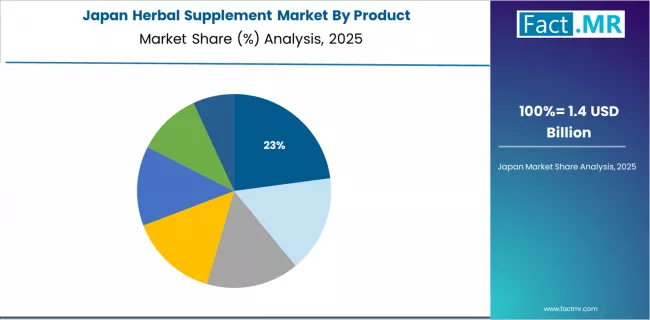
Japan's sophisticated wellness market demonstrates established herbal supplement integration with documented traditional medicine standards in product methodology and health protocol execution through comprehensive Kampo medicine heritage and specialized wellness facilities.
The country maintains a 6.8% growth rate, leveraging established traditional medicine knowledge and comprehensive quality oversight frameworks in natural health. Major urban centers, including Tokyo, Osaka, and Nagoya regions, showcase traditional quality emphasis where herbal supplement integrate with established cultural wellness standards and meticulous preparation practices to optimize health assurance and maintain regulatory compliance under comprehensive natural product supervision.
Japanese consumers prioritize comprehensive traditional validation and modern quality integration in supplement selection implementation, creating demand for heritage-based products with extensive documentation characteristics, including traditional medicine certification, quality system validation, and comprehensive efficacy reports. The market benefits from established wellness reputation and quality-focused health culture that provide premium positioning opportunities and comply with strict Japanese natural product specifications.
Europe Market Split by Country
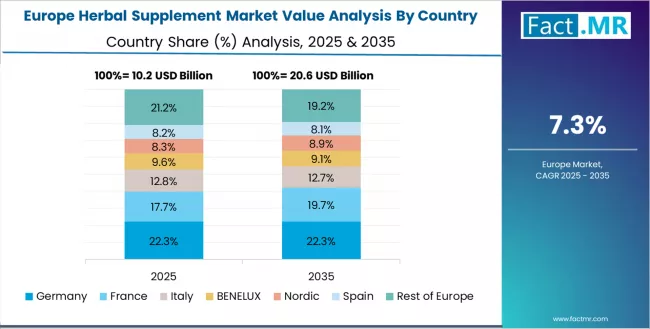
The European herbal supplement market is projected to grow from USD 10.96 billion in 2025 to USD 25.79 billion by 2035, representing 24.0% of the global market in 2025 and maintaining 24.0% by 2035. Germany is expected to maintain its leadership position with USD 2.94 billion in 2025, accounting for 26.8% of the European market, supported by its advanced phytotherapy infrastructure and established natural medicine networks.
France follows with USD 2.07 billion, representing 18.9% of the European market in 2025, driven by comprehensive pharmacy integration and wellness consumer concentration. UK holds USD 1.90 billion with 17.3% market share through established natural health product pathways and wellness retail density.
Italy commands USD 1.56 billion representing 14.2% share, while Spain accounts for USD 1.27 billion or 11.6% in 2025. The rest of Europe region maintains USD 1.23 billion, representing 11.2% of the European market, attributed to increasing herbal supplement adoption in Nordic countries and emerging Eastern European wellness sectors implementing natural health programs.
Competitive Landscape of the Herbal Supplement Market
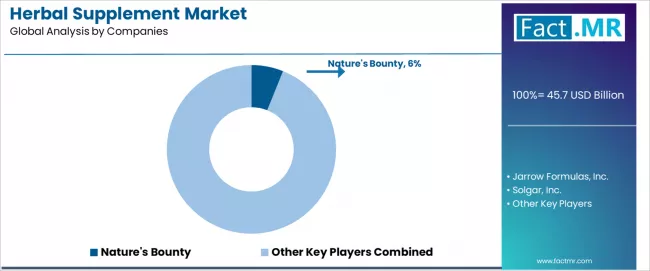
The herbal supplement market exhibits a moderately fragmented competitive structure with approximately 100-150 active players operating across global wellness networks and regional natural product distribution portfolios. Nature's Bounty maintains market leadership at a 6.1% share, reflecting strong product portfolio positioning across diverse herbal applications with sophisticated global distribution strategies.
This competitive landscape demonstrates the maturation of botanical supplement technology, where established players leverage brand recognition advantages, extensive quality validation evidence documentation, and retailer relationship programs to maintain dominant positions, while emerging specialized botanical developers and regional herbal companies create niche opportunities through traditional medicine offerings and organic certification strategies.
Market leadership is maintained through several critical competitive advantages extending beyond manufacturing capabilities and product portfolios. Global distribution networks enable leading players to navigate diverse regulatory requirements and access varied retail segments including pharmacies, health food stores, and online wellness platforms.
Quality assurance infrastructure and scientific validation program availability represent crucial differentiators in herbal supplement categories, where decades of botanical sourcing expertise, standardization protocols, and safety testing frameworks create purchasing preference among quality-focused consumers.
Manufacturing efficiency in GMP-certified production facilities, supply chain traceability management, and ingredient authentication control separate major suppliers from smaller competitors, while comprehensive quality documentation addressing purity standards, potency validation studies, and contamination testing strengthen market position and consumer confidence.
The market demonstrates emerging differentiation opportunities in personalized supplement categories and clinically tested formulation technologies, where traditional generic herbal products face competition from innovation-focused entrants offering customization advantages. However, significant competitive advantages persist in established single-herb categories through comprehensive quality proven portfolios and retail relationship depth.
Premium positioning strategies with organic certification and clinical validation capabilities command margin premiums through superior quality assurance and efficacy evidence integration. Specialized product portfolios combining multiple botanical ingredients with synergistic formulation designs create comprehensive positioning that justifies higher price points beyond commodity herbal competition.
Integrated wellness solution offerings emphasizing complementary product compatibility, unified consumer education support, and cross-application wellness programs generate brand loyalty and supplement regimen preferences beyond transactional herbal purchases.
| Stakeholder | What they actually control | Typical strengths | Typical blind spots |
|---|---|---|---|
| Global supplement corporations | Comprehensive product portfolios; global distribution; quality documentation | Brand recognition; quality validation; retail relationships; supply networks | Innovation speed; customization flexibility; traditional medicine authenticity; regional botanicals |
| Specialized herbal companies | Botanical expertise; formulation innovation; quality sourcing | Product differentiation; ingredient authenticity; practitioner loyalty; traditional knowledge | Market penetration; distribution scale; price competitiveness; regulatory navigation |
| Traditional medicine brands | Heritage positioning; cultural credibility; traditional formulations | Authenticity positioning; consumer trust; traditional knowledge; regional loyalty | Modern validation; clinical evidence; international expansion; standardization |
| E-commerce direct brands | Digital marketing; customer data; subscription models; direct relationships | Consumer engagement; personalization; cost structure; agile innovation | Retail presence; practitioner relationships; quality perception; regulatory compliance |
| Retail pharmacy chains | Distribution access; consumer traffic; healthcare proximity; professional endorsement | Market reach; convenience positioning; trusted environment; healthcare integration | Product development; brand differentiation; ingredient sourcing; innovation speed |
Key Players in the Herbal Supplement Market
- Nature's Bounty
- Jarrow Formulas, Inc.
- Solgar, Inc.
- Ancient GreenFields Pvt. Ltd.
- Gaia Herbs
- NOW Foods
- Herbalife Nutrition
- Swanson Health
- Nature's Way
- Amway Corporation
Scope of the Report
| Items | Values |
|---|---|
| Quantitative Units (2025) | USD 45.65 billion |
| Product | Turmeric, Moringa, Ginger, Ginseng, Echinacea, Flaxseeds, Others |
| Formulation | Capsules, Tablets, Powder, Liquid, Soft Gels, Others |
| Consumer | Adults, Geriatric, Pediatric, Pregnant Women |
| Distribution Channel | Offline, Online |
| Regions Covered | North America, Europe, Asia Pacific, Latin America, Middle East & Africa |
| Countries Covered | USA, China, India, Germany, UK, Canada, Japan, and 15+ additional countries |
| Key Companies Profiled | Nature's Bounty, Jarrow Formulas Inc., Solgar Inc., Ancient GreenFields Pvt. Ltd., Gaia Herbs, NOW Foods, Herbalife Nutrition, Swanson Health |
| Additional Attributes | Dollar sales by product and formulation categories, regional adoption trends across Asia Pacific, North America, and Europe, competitive landscape with established supplement corporations and specialized herbal companies, consumer preferences for turmeric products and capsule formulations, integration with pharmacy retail networks and online wellness platforms, innovations in personalized nutrition technologies and evidence-based botanical platforms, and development of sophisticated herbal supplement systems with enhanced quality profiles and comprehensive scientific documentation frameworks. |
Herbal Supplement Market by Segments
-
Product :
- Turmeric
- Moringa
- Ginger
- Ginseng
- Echinacea
- Flaxseeds
- Others
-
Formulation :
- Capsules
- Tablets
- Powder
- Liquid
- Soft Gels
- Others
-
Consumer :
- Adults
- Geriatric
- Pediatric
- Pregnant Women
-
Distribution Channel :
- Offline
- Online
-
Region :
- North America
- USA
- Canada
- Mexico
- Europe
- Germany
- France
- UK
- Italy
- Spain
- Rest of Europe
- Asia Pacific
- India
- China
- Japan
- South Korea
- ASEAN
- Australia & New Zealand
- Rest of Asia Pacific
- Latin America
- Brazil
- Rest of Latin America
- Middle East & Africa
- GCC Countries
- South Africa
- Rest of Middle East & Africa
- North America
Table of Content
- Executive Summary
- Global Market Outlook
- Demand to side Trends
- Supply to side Trends
- Technology Roadmap Analysis
- Analysis and Recommendations
- Market Overview
- Market Coverage / Taxonomy
- Market Definition / Scope / Limitations
- Market Background
- Market Dynamics
- Drivers
- Restraints
- Opportunity
- Trends
- Scenario Forecast
- Demand in Optimistic Scenario
- Demand in Likely Scenario
- Demand in Conservative Scenario
- Opportunity Map Analysis
- Product Life Cycle Analysis
- Supply Chain Analysis
- Investment Feasibility Matrix
- Value Chain Analysis
- PESTLE and Porter’s Analysis
- Regulatory Landscape
- Regional Parent Market Outlook
- Production and Consumption Statistics
- Import and Export Statistics
- Market Dynamics
- Global Market Analysis 2020 to 2024 and Forecast, 2025 to 2035
- Historical Market Size Value (USD Million) Analysis, 2020 to 2024
- Current and Future Market Size Value (USD Million) Projections, 2025 to 2035
- Y to o to Y Growth Trend Analysis
- Absolute $ Opportunity Analysis
- Global Market Pricing Analysis 2020 to 2024 and Forecast 2025 to 2035
- Global Market Analysis 2020 to 2024 and Forecast 2025 to 2035, By Product
- Introduction / Key Findings
- Historical Market Size Value (USD Million) Analysis By Product, 2020 to 2024
- Current and Future Market Size Value (USD Million) Analysis and Forecast By Product, 2025 to 2035
- Turmeric
- Moringa
- Ginger
- Ginseng
- Echinacea
- Flaxseeds
- Others
- Y to o to Y Growth Trend Analysis By Product, 2020 to 2024
- Absolute $ Opportunity Analysis By Product, 2025 to 2035
- Global Market Analysis 2020 to 2024 and Forecast 2025 to 2035, By Formulation
- Introduction / Key Findings
- Historical Market Size Value (USD Million) Analysis By Formulation, 2020 to 2024
- Current and Future Market Size Value (USD Million) Analysis and Forecast By Formulation, 2025 to 2035
- Capsules
- Tablets
- Powder
- Liquid
- Soft Gels
- Others
- Y to o to Y Growth Trend Analysis By Formulation, 2020 to 2024
- Absolute $ Opportunity Analysis By Formulation, 2025 to 2035
- Global Market Analysis 2020 to 2024 and Forecast 2025 to 2035, By Consumer
- Introduction / Key Findings
- Historical Market Size Value (USD Million) Analysis By Consumer, 2020 to 2024
- Current and Future Market Size Value (USD Million) Analysis and Forecast By Consumer, 2025 to 2035
- Adults
- Geriatric
- Pediatric
- Pregnant Women
- Y to o to Y Growth Trend Analysis By Consumer, 2020 to 2024
- Absolute $ Opportunity Analysis By Consumer, 2025 to 2035
- Global Market Analysis 2020 to 2024 and Forecast 2025 to 2035, By Distribution Channel
- Introduction / Key Findings
- Historical Market Size Value (USD Million) Analysis By Distribution Channel, 2020 to 2024
- Current and Future Market Size Value (USD Million) Analysis and Forecast By Distribution Channel, 2025 to 2035
- Offline
- Online
- Y to o to Y Growth Trend Analysis By Distribution Channel, 2020 to 2024
- Absolute $ Opportunity Analysis By Distribution Channel, 2025 to 2035
- Global Market Analysis 2020 to 2024 and Forecast 2025 to 2035, By Region
- Introduction
- Historical Market Size Value (USD Million) Analysis By Region, 2020 to 2024
- Current Market Size Value (USD Million) Analysis and Forecast By Region, 2025 to 2035
- North America
- Latin America
- Western Europe
- Eastern Europe
- East Asia
- South Asia and Pacific
- Middle East & Africa
- Market Attractiveness Analysis By Region
- North America Market Analysis 2020 to 2024 and Forecast 2025 to 2035, By Country
- Historical Market Size Value (USD Million) Trend Analysis By Market Taxonomy, 2020 to 2024
- Market Size Value (USD Million) Forecast By Market Taxonomy, 2025 to 2035
- By Country
- USA
- Canada
- Mexico
- By Product
- By Formulation
- By Consumer
- By Distribution Channel
- By Country
- Market Attractiveness Analysis
- By Country
- By Product
- By Formulation
- By Consumer
- By Distribution Channel
- Key Takeaways
- Latin America Market Analysis 2020 to 2024 and Forecast 2025 to 2035, By Country
- Historical Market Size Value (USD Million) Trend Analysis By Market Taxonomy, 2020 to 2024
- Market Size Value (USD Million) Forecast By Market Taxonomy, 2025 to 2035
- By Country
- Brazil
- Chile
- Rest of Latin America
- By Product
- By Formulation
- By Consumer
- By Distribution Channel
- By Country
- Market Attractiveness Analysis
- By Country
- By Product
- By Formulation
- By Consumer
- By Distribution Channel
- Key Takeaways
- Western Europe Market Analysis 2020 to 2024 and Forecast 2025 to 2035, By Country
- Historical Market Size Value (USD Million) Trend Analysis By Market Taxonomy, 2020 to 2024
- Market Size Value (USD Million) Forecast By Market Taxonomy, 2025 to 2035
- By Country
- Germany
- UK
- Italy
- Spain
- France
- Nordic
- BENELUX
- Rest of Western Europe
- By Product
- By Formulation
- By Consumer
- By Distribution Channel
- By Country
- Market Attractiveness Analysis
- By Country
- By Product
- By Formulation
- By Consumer
- By Distribution Channel
- Key Takeaways
- Eastern Europe Market Analysis 2020 to 2024 and Forecast 2025 to 2035, By Country
- Historical Market Size Value (USD Million) Trend Analysis By Market Taxonomy, 2020 to 2024
- Market Size Value (USD Million) Forecast By Market Taxonomy, 2025 to 2035
- By Country
- Russia
- Poland
- Hungary
- Balkan & Baltic
- Rest of Eastern Europe
- By Product
- By Formulation
- By Consumer
- By Distribution Channel
- By Country
- Market Attractiveness Analysis
- By Country
- By Product
- By Formulation
- By Consumer
- By Distribution Channel
- Key Takeaways
- East Asia Market Analysis 2020 to 2024 and Forecast 2025 to 2035, By Country
- Historical Market Size Value (USD Million) Trend Analysis By Market Taxonomy, 2020 to 2024
- Market Size Value (USD Million) Forecast By Market Taxonomy, 2025 to 2035
- By Country
- China
- Japan
- South Korea
- By Product
- By Formulation
- By Consumer
- By Distribution Channel
- By Country
- Market Attractiveness Analysis
- By Country
- By Product
- By Formulation
- By Consumer
- By Distribution Channel
- Key Takeaways
- South Asia and Pacific Market Analysis 2020 to 2024 and Forecast 2025 to 2035, By Country
- Historical Market Size Value (USD Million) Trend Analysis By Market Taxonomy, 2020 to 2024
- Market Size Value (USD Million) Forecast By Market Taxonomy, 2025 to 2035
- By Country
- India
- ASEAN
- Australia & New Zealand
- Rest of South Asia and Pacific
- By Product
- By Formulation
- By Consumer
- By Distribution Channel
- By Country
- Market Attractiveness Analysis
- By Country
- By Product
- By Formulation
- By Consumer
- By Distribution Channel
- Key Takeaways
- Middle East & Africa Market Analysis 2020 to 2024 and Forecast 2025 to 2035, By Country
- Historical Market Size Value (USD Million) Trend Analysis By Market Taxonomy, 2020 to 2024
- Market Size Value (USD Million) Forecast By Market Taxonomy, 2025 to 2035
- By Country
- Kingdom of Saudi Arabia
- Other GCC Countries
- Turkiye
- South Africa
- Other African Union
- Rest of Middle East & Africa
- By Product
- By Formulation
- By Consumer
- By Distribution Channel
- By Country
- Market Attractiveness Analysis
- By Country
- By Product
- By Formulation
- By Consumer
- By Distribution Channel
- Key Takeaways
- Key Countries Market Analysis
- USA
- Pricing Analysis
- Market Share Analysis, 2024
- By Product
- By Formulation
- By Consumer
- By Distribution Channel
- Canada
- Pricing Analysis
- Market Share Analysis, 2024
- By Product
- By Formulation
- By Consumer
- By Distribution Channel
- Mexico
- Pricing Analysis
- Market Share Analysis, 2024
- By Product
- By Formulation
- By Consumer
- By Distribution Channel
- Brazil
- Pricing Analysis
- Market Share Analysis, 2024
- By Product
- By Formulation
- By Consumer
- By Distribution Channel
- Chile
- Pricing Analysis
- Market Share Analysis, 2024
- By Product
- By Formulation
- By Consumer
- By Distribution Channel
- Germany
- Pricing Analysis
- Market Share Analysis, 2024
- By Product
- By Formulation
- By Consumer
- By Distribution Channel
- UK
- Pricing Analysis
- Market Share Analysis, 2024
- By Product
- By Formulation
- By Consumer
- By Distribution Channel
- Italy
- Pricing Analysis
- Market Share Analysis, 2024
- By Product
- By Formulation
- By Consumer
- By Distribution Channel
- Spain
- Pricing Analysis
- Market Share Analysis, 2024
- By Product
- By Formulation
- By Consumer
- By Distribution Channel
- France
- Pricing Analysis
- Market Share Analysis, 2024
- By Product
- By Formulation
- By Consumer
- By Distribution Channel
- India
- Pricing Analysis
- Market Share Analysis, 2024
- By Product
- By Formulation
- By Consumer
- By Distribution Channel
- ASEAN
- Pricing Analysis
- Market Share Analysis, 2024
- By Product
- By Formulation
- By Consumer
- By Distribution Channel
- Australia & New Zealand
- Pricing Analysis
- Market Share Analysis, 2024
- By Product
- By Formulation
- By Consumer
- By Distribution Channel
- China
- Pricing Analysis
- Market Share Analysis, 2024
- By Product
- By Formulation
- By Consumer
- By Distribution Channel
- Japan
- Pricing Analysis
- Market Share Analysis, 2024
- By Product
- By Formulation
- By Consumer
- By Distribution Channel
- South Korea
- Pricing Analysis
- Market Share Analysis, 2024
- By Product
- By Formulation
- By Consumer
- By Distribution Channel
- Russia
- Pricing Analysis
- Market Share Analysis, 2024
- By Product
- By Formulation
- By Consumer
- By Distribution Channel
- Poland
- Pricing Analysis
- Market Share Analysis, 2024
- By Product
- By Formulation
- By Consumer
- By Distribution Channel
- Hungary
- Pricing Analysis
- Market Share Analysis, 2024
- By Product
- By Formulation
- By Consumer
- By Distribution Channel
- Kingdom of Saudi Arabia
- Pricing Analysis
- Market Share Analysis, 2024
- By Product
- By Formulation
- By Consumer
- By Distribution Channel
- Turkiye
- Pricing Analysis
- Market Share Analysis, 2024
- By Product
- By Formulation
- By Consumer
- By Distribution Channel
- South Africa
- Pricing Analysis
- Market Share Analysis, 2024
- By Product
- By Formulation
- By Consumer
- By Distribution Channel
- USA
- Market Structure Analysis
- Competition Dashboard
- Competition Benchmarking
- Market Share Analysis of Top Players
- By Regional
- By Product
- By Formulation
- By Consumer
- By Distribution Channel
- Competition Analysis
- Competition Deep Dive
- Nature's Bounty
- Overview
- Product Portfolio
- Profitability by Market Segments (Product/Age /Sales Channel/Region)
- Sales Footprint
- Strategy Overview
- Marketing Strategy
- Product Strategy
- Channel Strategy
- Jarrow Formulas, Inc.
- Solgar, Inc.
- Ancient GreenFields Pvt. Ltd.
- Gaia Herbs
- NOW Foods
- Herbalife Nutrition
- Swanson Health
- Nature's Way
- Amway Corporation
- Nature's Bounty
- Competition Deep Dive
- Assumptions & Acronyms Used
- Research Methodology
List Of Table
- Table 1: Global Market Value (USD Million) Forecast by Region, 2020 to 2035
- Table 2: Global Market Value (USD Million) Forecast by Product, 2020 to 2035
- Table 3: Global Market Value (USD Million) Forecast by Formulation, 2020 to 2035
- Table 4: Global Market Value (USD Million) Forecast by Consumer, 2020 to 2035
- Table 5: Global Market Value (USD Million) Forecast by Distribution Channel, 2020 to 2035
- Table 6: North America Market Value (USD Million) Forecast by Country, 2020 to 2035
- Table 7: North America Market Value (USD Million) Forecast by Product, 2020 to 2035
- Table 8: North America Market Value (USD Million) Forecast by Formulation, 2020 to 2035
- Table 9: North America Market Value (USD Million) Forecast by Consumer, 2020 to 2035
- Table 10: North America Market Value (USD Million) Forecast by Distribution Channel, 2020 to 2035
- Table 11: Latin America Market Value (USD Million) Forecast by Country, 2020 to 2035
- Table 12: Latin America Market Value (USD Million) Forecast by Product, 2020 to 2035
- Table 13: Latin America Market Value (USD Million) Forecast by Formulation, 2020 to 2035
- Table 14: Latin America Market Value (USD Million) Forecast by Consumer, 2020 to 2035
- Table 15: Latin America Market Value (USD Million) Forecast by Distribution Channel, 2020 to 2035
- Table 16: Western Europe Market Value (USD Million) Forecast by Country, 2020 to 2035
- Table 17: Western Europe Market Value (USD Million) Forecast by Product, 2020 to 2035
- Table 18: Western Europe Market Value (USD Million) Forecast by Formulation, 2020 to 2035
- Table 19: Western Europe Market Value (USD Million) Forecast by Consumer, 2020 to 2035
- Table 20: Western Europe Market Value (USD Million) Forecast by Distribution Channel, 2020 to 2035
- Table 21: Eastern Europe Market Value (USD Million) Forecast by Country, 2020 to 2035
- Table 22: Eastern Europe Market Value (USD Million) Forecast by Product, 2020 to 2035
- Table 23: Eastern Europe Market Value (USD Million) Forecast by Formulation, 2020 to 2035
- Table 24: Eastern Europe Market Value (USD Million) Forecast by Consumer, 2020 to 2035
- Table 25: Eastern Europe Market Value (USD Million) Forecast by Distribution Channel, 2020 to 2035
- Table 26: East Asia Market Value (USD Million) Forecast by Country, 2020 to 2035
- Table 27: East Asia Market Value (USD Million) Forecast by Product, 2020 to 2035
- Table 28: East Asia Market Value (USD Million) Forecast by Formulation, 2020 to 2035
- Table 29: East Asia Market Value (USD Million) Forecast by Consumer, 2020 to 2035
- Table 30: East Asia Market Value (USD Million) Forecast by Distribution Channel, 2020 to 2035
- Table 31: South Asia and Pacific Market Value (USD Million) Forecast by Country, 2020 to 2035
- Table 32: South Asia and Pacific Market Value (USD Million) Forecast by Product, 2020 to 2035
- Table 33: South Asia and Pacific Market Value (USD Million) Forecast by Formulation, 2020 to 2035
- Table 34: South Asia and Pacific Market Value (USD Million) Forecast by Consumer, 2020 to 2035
- Table 35: South Asia and Pacific Market Value (USD Million) Forecast by Distribution Channel, 2020 to 2035
- Table 36: Middle East & Africa Market Value (USD Million) Forecast by Country, 2020 to 2035
- Table 37: Middle East & Africa Market Value (USD Million) Forecast by Product, 2020 to 2035
- Table 38: Middle East & Africa Market Value (USD Million) Forecast by Formulation, 2020 to 2035
- Table 39: Middle East & Africa Market Value (USD Million) Forecast by Consumer, 2020 to 2035
- Table 40: Middle East & Africa Market Value (USD Million) Forecast by Distribution Channel, 2020 to 2035
List Of Figures
- Figure 1: Global Market Pricing Analysis
- Figure 2: Global Market Value (USD Million) Forecast 2020 to 2035
- Figure 3: Global Market Value Share and BPS Analysis by Product, 2025 and 2035
- Figure 4: Global Market Y to o to Y Growth Comparison by Product, 2025-2035
- Figure 5: Global Market Attractiveness Analysis by Product
- Figure 6: Global Market Value Share and BPS Analysis by Formulation, 2025 and 2035
- Figure 7: Global Market Y to o to Y Growth Comparison by Formulation, 2025-2035
- Figure 8: Global Market Attractiveness Analysis by Formulation
- Figure 9: Global Market Value Share and BPS Analysis by Consumer, 2025 and 2035
- Figure 10: Global Market Y to o to Y Growth Comparison by Consumer, 2025-2035
- Figure 11: Global Market Attractiveness Analysis by Consumer
- Figure 12: Global Market Value Share and BPS Analysis by Distribution Channel, 2025 and 2035
- Figure 13: Global Market Y to o to Y Growth Comparison by Distribution Channel, 2025-2035
- Figure 14: Global Market Attractiveness Analysis by Distribution Channel
- Figure 15: Global Market Value (USD Million) Share and BPS Analysis by Region, 2025 and 2035
- Figure 16: Global Market Y to o to Y Growth Comparison by Region, 2025-2035
- Figure 17: Global Market Attractiveness Analysis by Region
- Figure 18: North America Market Incremental Dollar Opportunity, 2025-2035
- Figure 19: Latin America Market Incremental Dollar Opportunity, 2025-2035
- Figure 20: Western Europe Market Incremental Dollar Opportunity, 2025-2035
- Figure 21: Eastern Europe Market Incremental Dollar Opportunity, 2025-2035
- Figure 22: East Asia Market Incremental Dollar Opportunity, 2025-2035
- Figure 23: South Asia and Pacific Market Incremental Dollar Opportunity, 2025-2035
- Figure 24: Middle East & Africa Market Incremental Dollar Opportunity, 2025-2035
- Figure 25: North America Market Value Share and BPS Analysis by Country, 2025 and 2035
- Figure 26: North America Market Value Share and BPS Analysis by Product, 2025 and 2035
- Figure 27: North America Market Y to o to Y Growth Comparison by Product, 2025-2035
- Figure 28: North America Market Attractiveness Analysis by Product
- Figure 29: North America Market Value Share and BPS Analysis by Formulation, 2025 and 2035
- Figure 30: North America Market Y to o to Y Growth Comparison by Formulation, 2025-2035
- Figure 31: North America Market Attractiveness Analysis by Formulation
- Figure 32: North America Market Value Share and BPS Analysis by Consumer, 2025 and 2035
- Figure 33: North America Market Y to o to Y Growth Comparison by Consumer, 2025-2035
- Figure 34: North America Market Attractiveness Analysis by Consumer
- Figure 35: North America Market Value Share and BPS Analysis by Distribution Channel, 2025 and 2035
- Figure 36: North America Market Y to o to Y Growth Comparison by Distribution Channel, 2025-2035
- Figure 37: North America Market Attractiveness Analysis by Distribution Channel
- Figure 38: Latin America Market Value Share and BPS Analysis by Country, 2025 and 2035
- Figure 39: Latin America Market Value Share and BPS Analysis by Product, 2025 and 2035
- Figure 40: Latin America Market Y to o to Y Growth Comparison by Product, 2025-2035
- Figure 41: Latin America Market Attractiveness Analysis by Product
- Figure 42: Latin America Market Value Share and BPS Analysis by Formulation, 2025 and 2035
- Figure 43: Latin America Market Y to o to Y Growth Comparison by Formulation, 2025-2035
- Figure 44: Latin America Market Attractiveness Analysis by Formulation
- Figure 45: Latin America Market Value Share and BPS Analysis by Consumer, 2025 and 2035
- Figure 46: Latin America Market Y to o to Y Growth Comparison by Consumer, 2025-2035
- Figure 47: Latin America Market Attractiveness Analysis by Consumer
- Figure 48: Latin America Market Value Share and BPS Analysis by Distribution Channel, 2025 and 2035
- Figure 49: Latin America Market Y to o to Y Growth Comparison by Distribution Channel, 2025-2035
- Figure 50: Latin America Market Attractiveness Analysis by Distribution Channel
- Figure 51: Western Europe Market Value Share and BPS Analysis by Country, 2025 and 2035
- Figure 52: Western Europe Market Value Share and BPS Analysis by Product, 2025 and 2035
- Figure 53: Western Europe Market Y to o to Y Growth Comparison by Product, 2025-2035
- Figure 54: Western Europe Market Attractiveness Analysis by Product
- Figure 55: Western Europe Market Value Share and BPS Analysis by Formulation, 2025 and 2035
- Figure 56: Western Europe Market Y to o to Y Growth Comparison by Formulation, 2025-2035
- Figure 57: Western Europe Market Attractiveness Analysis by Formulation
- Figure 58: Western Europe Market Value Share and BPS Analysis by Consumer, 2025 and 2035
- Figure 59: Western Europe Market Y to o to Y Growth Comparison by Consumer, 2025-2035
- Figure 60: Western Europe Market Attractiveness Analysis by Consumer
- Figure 61: Western Europe Market Value Share and BPS Analysis by Distribution Channel, 2025 and 2035
- Figure 62: Western Europe Market Y to o to Y Growth Comparison by Distribution Channel, 2025-2035
- Figure 63: Western Europe Market Attractiveness Analysis by Distribution Channel
- Figure 64: Eastern Europe Market Value Share and BPS Analysis by Country, 2025 and 2035
- Figure 65: Eastern Europe Market Value Share and BPS Analysis by Product, 2025 and 2035
- Figure 66: Eastern Europe Market Y to o to Y Growth Comparison by Product, 2025-2035
- Figure 67: Eastern Europe Market Attractiveness Analysis by Product
- Figure 68: Eastern Europe Market Value Share and BPS Analysis by Formulation, 2025 and 2035
- Figure 69: Eastern Europe Market Y to o to Y Growth Comparison by Formulation, 2025-2035
- Figure 70: Eastern Europe Market Attractiveness Analysis by Formulation
- Figure 71: Eastern Europe Market Value Share and BPS Analysis by Consumer, 2025 and 2035
- Figure 72: Eastern Europe Market Y to o to Y Growth Comparison by Consumer, 2025-2035
- Figure 73: Eastern Europe Market Attractiveness Analysis by Consumer
- Figure 74: Eastern Europe Market Value Share and BPS Analysis by Distribution Channel, 2025 and 2035
- Figure 75: Eastern Europe Market Y to o to Y Growth Comparison by Distribution Channel, 2025-2035
- Figure 76: Eastern Europe Market Attractiveness Analysis by Distribution Channel
- Figure 77: East Asia Market Value Share and BPS Analysis by Country, 2025 and 2035
- Figure 78: East Asia Market Value Share and BPS Analysis by Product, 2025 and 2035
- Figure 79: East Asia Market Y to o to Y Growth Comparison by Product, 2025-2035
- Figure 80: East Asia Market Attractiveness Analysis by Product
- Figure 81: East Asia Market Value Share and BPS Analysis by Formulation, 2025 and 2035
- Figure 82: East Asia Market Y to o to Y Growth Comparison by Formulation, 2025-2035
- Figure 83: East Asia Market Attractiveness Analysis by Formulation
- Figure 84: East Asia Market Value Share and BPS Analysis by Consumer, 2025 and 2035
- Figure 85: East Asia Market Y to o to Y Growth Comparison by Consumer, 2025-2035
- Figure 86: East Asia Market Attractiveness Analysis by Consumer
- Figure 87: East Asia Market Value Share and BPS Analysis by Distribution Channel, 2025 and 2035
- Figure 88: East Asia Market Y to o to Y Growth Comparison by Distribution Channel, 2025-2035
- Figure 89: East Asia Market Attractiveness Analysis by Distribution Channel
- Figure 90: South Asia and Pacific Market Value Share and BPS Analysis by Country, 2025 and 2035
- Figure 91: South Asia and Pacific Market Value Share and BPS Analysis by Product, 2025 and 2035
- Figure 92: South Asia and Pacific Market Y to o to Y Growth Comparison by Product, 2025-2035
- Figure 93: South Asia and Pacific Market Attractiveness Analysis by Product
- Figure 94: South Asia and Pacific Market Value Share and BPS Analysis by Formulation, 2025 and 2035
- Figure 95: South Asia and Pacific Market Y to o to Y Growth Comparison by Formulation, 2025-2035
- Figure 96: South Asia and Pacific Market Attractiveness Analysis by Formulation
- Figure 97: South Asia and Pacific Market Value Share and BPS Analysis by Consumer, 2025 and 2035
- Figure 98: South Asia and Pacific Market Y to o to Y Growth Comparison by Consumer, 2025-2035
- Figure 99: South Asia and Pacific Market Attractiveness Analysis by Consumer
- Figure 100: South Asia and Pacific Market Value Share and BPS Analysis by Distribution Channel, 2025 and 2035
- Figure 101: South Asia and Pacific Market Y to o to Y Growth Comparison by Distribution Channel, 2025-2035
- Figure 102: South Asia and Pacific Market Attractiveness Analysis by Distribution Channel
- Figure 103: Middle East & Africa Market Value Share and BPS Analysis by Country, 2025 and 2035
- Figure 104: Middle East & Africa Market Value Share and BPS Analysis by Product, 2025 and 2035
- Figure 105: Middle East & Africa Market Y to o to Y Growth Comparison by Product, 2025-2035
- Figure 106: Middle East & Africa Market Attractiveness Analysis by Product
- Figure 107: Middle East & Africa Market Value Share and BPS Analysis by Formulation, 2025 and 2035
- Figure 108: Middle East & Africa Market Y to o to Y Growth Comparison by Formulation, 2025-2035
- Figure 109: Middle East & Africa Market Attractiveness Analysis by Formulation
- Figure 110: Middle East & Africa Market Value Share and BPS Analysis by Consumer, 2025 and 2035
- Figure 111: Middle East & Africa Market Y to o to Y Growth Comparison by Consumer, 2025-2035
- Figure 112: Middle East & Africa Market Attractiveness Analysis by Consumer
- Figure 113: Middle East & Africa Market Value Share and BPS Analysis by Distribution Channel, 2025 and 2035
- Figure 114: Middle East & Africa Market Y to o to Y Growth Comparison by Distribution Channel, 2025-2035
- Figure 115: Middle East & Africa Market Attractiveness Analysis by Distribution Channel
- Figure 116: Global Market - Tier Structure Analysis
- Figure 117: Global Market - Company Share Analysis
- FAQs -
How big is the herbal supplement market in 2025?
The global herbal supplement market is estimated to be valued at USD 45.7 billion in 2025.
What will be the size of herbal supplement market in 2035?
The market size for the herbal supplement market is projected to reach USD 107.4 billion by 2035.
How much will be the herbal supplement market growth between 2025 and 2035?
The herbal supplement market is expected to grow at a 8.9% CAGR between 2025 and 2035.
What are the key product types in the herbal supplement market?
The key product types in herbal supplement market are turmeric, moringa, ginger, ginseng, echinacea, flaxseeds and others.
Which formulation segment to contribute significant share in the herbal supplement market in 2025?
In terms of formulation, capsules segment to command 31.5% share in the herbal supplement market in 2025.